Janine Jackson interviewed the Upsurge‘s Teddy Ostrow about the UPS/Teamsters agreement for the August 4, 2023, episode of CounterSpin. This is a lightly edited transcript.
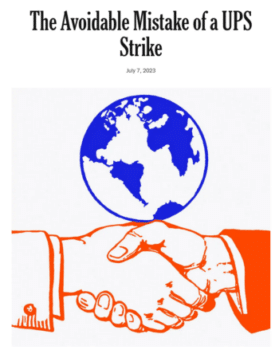
New York Times (7/7/23)
Janine Jackson: In early July, the New York Times ran an article that said, “The world is watching what happens at the UPS/Teamsters negotiating table because a strike would cause real problems.”
It’s true that many eyes were on the working out of an agreement between UPS, which handles roughly a quarter of packages shipped in this country, and the Teamsters, representing some 340,000 workers in this critical sector.
But it’s funny how corporate news media choose to define labor’s power in terms of destructiveness. Somehow it’s “it’d be rotten if they stopped working,” and not “they and their work are very important.”
That said, the agreement reached, the success and solidarity in getting to it—that’s very much a story worth telling. Our guest has been telling it. Teddy Ostrow reports on labor and economics. He’s host and lead producer of the podcast the Upsurge, as well as a former FAIR intern. He joins us now by phone from Brooklyn. Welcome to CounterSpin, Teddy Ostrow.
Teddy Ostrow: Pleasure to be here, Janine.
JJ: Part of the loss from corporate media’s general failure to report regularly and inclusively on labor is that people who haven’t been in a union or in a union family may be, frankly, unfamiliar with how things happen in contract negotiations, for example.
So I want to talk about the content of the agreement, but first of all, we’re recording on Wednesday, August 2; what should we know about the state of play right now?
TO: So there was a tentative agreement that was reached on July 25. That’s not a done deal, right? This is tentative, meaning that the workers, in a democratic fashion, are going to be voting between August 3 and August 22 about whether or not this is good enough for them.
Basically, if they vote it down, the union leadership will go back to the table and try to get something better. And if they can’t work out a deal, the strike is still potential, right? 340,000 workers, one of the largest potential strikes in decades, still really could happen.
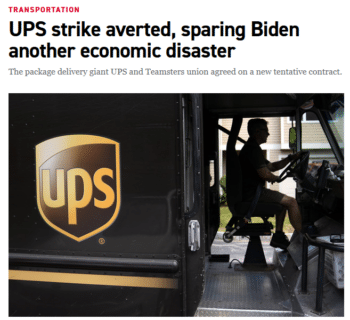
Politico (7/25/23)
JJ: So the headlines that sort of give you the impression that a strike has been averted, it’s true, but it really means “averted for now,” and there’s not a contract that’s signed yet, just to be clear.
TO: Yes, we are seeing in headlines right now, some corporate media headlines are being a little bit clearer, you can see that they actually are revising the headlines; perhaps business reporters who are assigned to these stories actually understand what’s going on.
But yeah, this is not a done deal. Nothing was averted, prevented, headed off quite yet, and we can talk about some of the issues of that framing in itself. But yeah, this is not over yet. We are still waiting on the democratic process of voting on this.
JJ: I do believe that people are learning that strikes and labor actions are not only about higher pay—though that is often central—but people can see the economy shifting, they know that more things are being bought online and delivered; it’s even sort of culturally acknowledged, you know, “Get to know your UPS person.” So what were the central issues in dispute here?
TO: One of the main issues certainly was pay, but in particular for the part-time workforce at UPS, which comprised 60% of the Teamsters who work at UPS. And these folks are making as low as $15.50 an hour, which is completely unlivable, and a lot of these people were living in poverty.
But beyond even just the economics, we’re looking at the case of forced and excessive overtime really making people’s lives harder, working up to 14 hours a day, up to six days a week, in the case of package delivery car drivers.

Labor Notes (7/12/23)
And we’re also talking about the real, serious risks of even death and heat stroke and other weather-related hazards in the warehouse, in the package car, as we’re dealing with the climate crisis.
And there’s a number of other issues, and in this TA, it does seem like the Teamsters have made a number of gains. It’s up to the membership to decide whether those gains are sufficient. There is certainly devil-in-the-details in certain cases, and some folks are speaking up and saying, “We’re going to vote no,” “We’re going to vote yes.” We’ll have to wait and see.
But the story here is that workers fought really hard over the past year, 340,000 Teamsters at this company. They, for the past year, have been doing a contract campaign, which is really just about making sure that the membership is educated, making sure that they are organized and mobilized and building a credible strike threat.
And that’s the narrative here. It’s not that anything was averted, that the economy was saved, but that workers fought and they won. And perhaps the workers will decide that they could have fought and won for more.
But all of the news we’ve been seeing about practice picket lines, about rallies, about educating the workforce: This is why the workers have achieved what they have so far, and whether it’s part-time pay, whether it’s gaining air conditioning in the delivery car, whether it’s tamping down on some of that forced overtime, workers fought and they certainly did win.
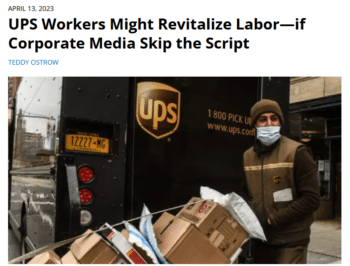
FAIR.org (4/13/22)
JJ: We know that you are a media observer, and understand the importance of press coverage, here as elsewhere. You’ve started to tip it, but what have you made of the reporting of, first of all, the circumstances and conditions that led to the action and the forces involved, but then of the goings on themselves: What stands out for you?
TO: Well, of course we’re seeing most media jump on the story at the 11th hour. So there wasn’t a lot of work done necessarily to explain the history leading up to this, the struggles for years of these workers, and the organizing done to make sure that there was a credible strike threat, and that the workers could win concessions from the company.
But what we’re looking at is this sort of sigh of relief coming from media that the strike has been averted, it’s been prevented, this looming strike that would’ve crippled or devastated the economy—that is stripped of context. It’s almost like an asteroid decided to not hit the Earth, right? We’re seeing a lot of peddling in catastrophism.
And what this does is it sort of invokes “the economy.” That’s what we’ve been hearing, “the economy” as the potential victim or victor in the case of an averted strike, which is really just framing us as the consumer, framing us as in alliance with corporations.
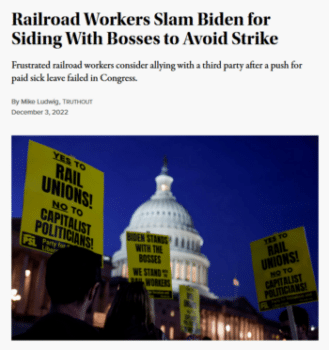
Truthout (12/3/22)
Because when they say “the economy,” which is what we’ve been hearing in the case of the preemptively broken rail strike last year, in this case as well, they are talking about the flow of capital. They are talking about the flow of profits.
And as the consumer audience, framed as the consumer, we’re supposed to identify with that. And we hear “the economy could be harmed,” and we’re supposed to think that I or my family or my friends will be harmed by this. We will be inconvenienced by our packages perhaps not coming on time.
And what this does, it completely overshadows the stakes for the workers, the problems that these workers have been dealing with, which include death, harassment, sickness, not being able to see your kids in the morning or at night because you are being forced to work all day, living in shelters, living on the streets because you don’t have enough money to live and pay for necessities.
It papers [over] all of that, and it overlooks that the audience the corporate media is catering to, well, they’re workers themselves! And the knowledge of the benefit of a better agreement of a potential strike is lost on corporate or on the audience of corporate media.
Because as workers, when other workers do better, when the 340,000 UPS workers get better benefits, get better pay, they have better working conditions—that can have reverberations in the effective standards in the industry. And it can also have demonstration effects that workers in other industries, all around the country, can maybe use the leverage that they have, the principal leverage against their employers, which is the threat of a strike, to get what they deserve, to get what they want.
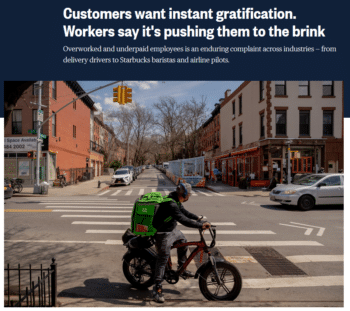
AP via NBC (7/31/23)
We are just seeing all of that context stripped out by this singular framing of, “Phew, the strike was averted. Good thing for consumers, good thing for corporations. And, of course, you media consumers.”
JJ: We talk about this all the time, the way that when it comes to labor actions, corporate media try to split customers or consumers and workers, as though workers weren’t consumers and consumers weren’t workers.
And AP, in this instance, ran a piece that was headlined, I tracked it through Nexis: Hawaii, a newspaper ran it, and they headlined it, “Customers Want Instant Gratification. Workers Say It’s Pushing Them to the Brink.”
Then in Rhode Island, the headline was, “Consumer Demand for Speed and Convenience Driving Labor Unrest.” And then in Vancouver, Washington, “Labor Unrest Driven by Consumers’ Demands.”
And sometimes that’s easy for media to do, although it’s lazy and disingenuous. But with Sean O’Brien, the head of the Teamsters, and the head of UPS, Carol Tomé, both coming out saying this tentative agreement is a “win/win/win,” media can only do their worker vs. consumer shtick in a kind of counterfactual, “Well, it really would’ve been bad” sort of way. I think it complicates media’s tendency to try to square off consumers vs. workers in this case.

Teddy Ostrow: “Something’s happening in the United States for workers. They’re seeing through the pleading-poverty of the corporations.”
TO: And we are seeing sort of desperate attempts to spin this, I think: “The rates are going to go up. UPS is going to lose their volumes to competition.” And it seems almost as if there’s still this reflexive framing to whatever happens in the case of a labor dispute, that the workers have somehow squeezed out the profitability, and therefore the service, of the corporation.
Thankfully, we are starting to see at least some acknowledgement. I think that things have probably changed over time, especially since UPS Teamsters obstructed the company last in 1997, where there was a pretty firm line that this is all about the inconvenience to the consumer.
But things are changing more broadly in the labor movement. I think that the corporate media have their feet to the fire, to start actually asking questions about inequality and corporate power.
We’re seeing it with the 160,000 actors out on strike. We’re seeing it with the 11,000 writers. LA seems to be a real powerhouse right now for the labor movement.
But more broadly, the story here they’re trying to bend themselves not to exactly tell, but are being forced to tell, is that something’s happening in the United States for workers. They’re seeing through the pleading-poverty of the corporations, whether it’s UPS or the AMPTP in Hollywood, and they’re saying, “Look, we deserve more.” And they’re starting to see unions, they’re starting to see collective action, as the avenue to take back what they create. Workers create wealth, and they are starting to recognize that.
So corporate media, as they did in 1997, temporarily, they’re starting to sort of bend to that. And we are seeing more labor reporters, for example, but even in the regular press, acknowledgement that a tentative deal, whether it’s this one or the next one, is going to raise the standard. And it is a part of a larger movement that we’re seeing that is hopefully resurgent, and is going to help working people for years to come.
JJ: All right then, let’s end on that note. We’ve been speaking with reporter Teddy Ostrow, from the podcast the Upsurge. Thank you so much, Teddy Ostrow, for joining us this week on CounterSpin.
TO: Thanks for having me, Janine.

